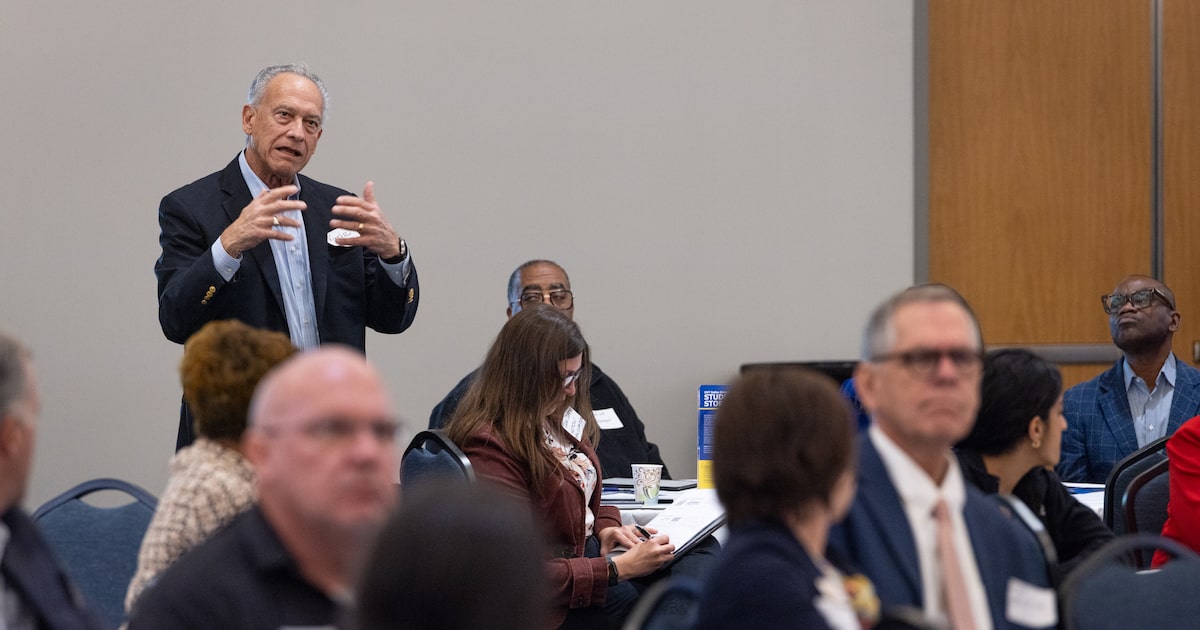In southern Dallas County, leaders at companies that handle drone deliveries, autonomous trucks and other innovation shared their visions for the area. Home to the Inland Port, the region sees thousands of trucks hauling goods, along with manufacturing and distribution centers.
“We’re bringing all the players together,” said Laura Freeland, executive director of the Inland Port Transportation Management Association, noting that representatives from cities, educational institutions and political offices attended alongside community members.
Dozens gathered for the second Southern Dallas Region Innovation Summit on Tuesday at the University of North Texas at Dallas. The event, also put on by the Inland Port Transportation Management Association and University of North Texas, addressed innovations involving artificial intelligence, autonomous systems, aerospace, energy and emissions.
Freeland said that with the community and stakeholders involved, there is a way to have accountability, push for change and address issues that have impacted the region. For example, attendees asked about gentrification, air quality and hiring practices, among other topics.“We’re already doing these deliveries that are addressing food deserts,” Freeland said.
Breaking News
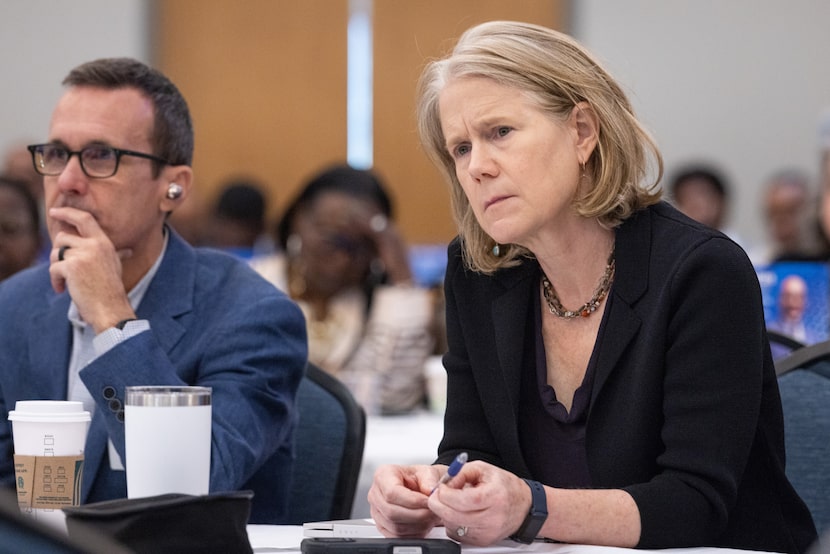
Laura Freeland, executive director of the Southern Dallas County Inland Port Transportation Management Association, listens to a panel about AI and Logistics at a Southern Dallas Region Innovation Summit on campus, Tuesday, Oct. 21, 2025, in Dallas.
Angela Piazza / Staff Photographer
Over the summer, Zipline, which provides drone delivery services, launched in southern Dallas, where groceries could be delivered from a Walmart in Buckner Terrace.
“We have the ability to get to areas that may live in food deserts, or fresh produce, fresh fruits and vegetables may not be accessible as easily,” said Jake Robinson, a manager with Zipline.
Areas covered by the Inland Port are farther south. Near interstates 20, 35E, and 45, the Inland Port includes the southernmost part of Dallas and spans four other cities. Sprawling across 76,000 acres, the port includes rail lines and involves employers like Amazon, FedEx and Walmart. In addition to Dallas, companies operate in cities south of Dallas like Lancaster, DeSoto, Wilmer or Hutchins.
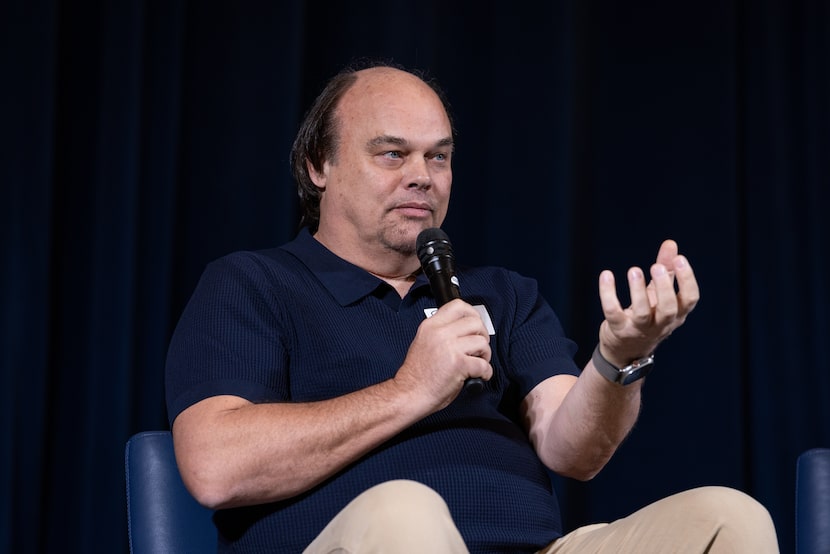
CEO at Worlds Dave Copps speaks on a panel about AI and Logistics at a Southern Dallas Region Innovation Summit on campus, Tuesday, Oct. 21, 2025, in Dallas.
Angela Piazza / Staff Photographer
Panelists included a wide range of representatives, including from businesses like AT&T and Pilot Company, or Kodiak, which has been testing and developing self-driving trucks. Dave Copps, CEO of AI platform company Worlds, said artificial intelligence shouldn’t be feared. It has the potential to amplify and accelerate work for companies to do more, rather than reducing employees.
“It’s not that people are going to go away,” Copps said. “We’re going to do more and we might need more people.”David Evans, with Sentiero Ventures, said while on a panel that RedBird is a good example of a business model starting from what’s new, much in the way AI could be involved in new ideas.
RedBird has been reimagining its development, with affordable housing, medical services and childcare, among other amenities, being added to the site.
Related
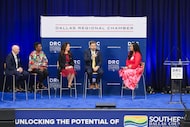
Peter Brodsky, CEO of the Shops at RedBird, was the keynote speaker Tuesday. He kicked off the morning with an overview of the area. Southern Dallas had been painted with a broad brush, he said, as an area that is universally poor. This, despite its beautiful homes, parks and community members, Brodsky said.
Rather than looking at the community as one in need of philanthropy, he said he’s looking it as “a market that is not being served the quality amenities that the citizens that the residents of this area desire, deserve and can easily afford.”
People in the neighborhood want amenities in the northern part of the city but simply don’t have them, he said.
“So, I looked at that and said, This is a supply-demand imbalance,” Brodsky said. “In capitalism, that’s how you make money.”
He said that he’s trying to make money in a way that benefits the community. The community has a history of not being treated well by businesses or governments, Brodsky told the group. However, he’s seen how delivering on promises means having loyal community support.
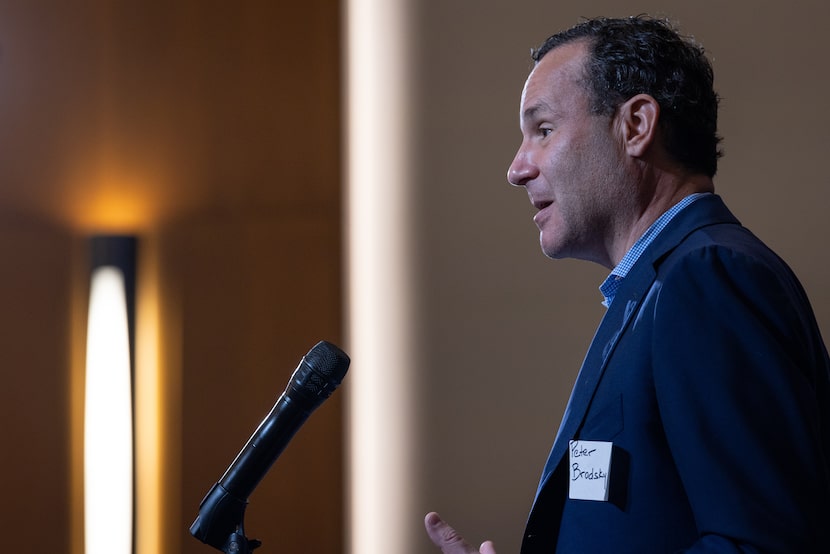
Peter Brodsky, CEO of Shops at RedBird, gives a keynote speech at a Southern Dallas Region Innovation Summit on the University of North Texas Dallas campus, Tuesday, Oct. 21, 2025, in Dallas.
Angela Piazza / Staff Photographer
One attendee asked Brodsky how he would handle gentrification. Brodsky said gentrification can mean raising property tax values, which the city wants, or bringing quality amenities. However, negatively, he said it can mean displacement as land values rise.
“All of the sudden, the people who live in that community can no longer afford to live there,” Brodsky said. “That’s happened a lot in this city.”
In the area around RedBird, Brodsky said the mall was trying to “lift all boats” by creating jobs, adding affordable housing, or having space for entrepreneurs to work.
“There will always be some displacement,” Brodsky said. “But the idea is to mitigate the displacement so that you end up with a true mixed-income community that’s thriving.”
This reporting is part of the Future of North Texas, a community-funded journalism initiative supported by the Commit Partnership, Communities Foundation of Texas, The Dallas Foundation, the Dallas Mavericks, the Dallas Regional Chamber, Deedie Rose, Lisa and Charles Siegel, the McCune-Losinger Family Fund, The Meadows Foundation, the Perot Foundation, the United Way of Metropolitan Dallas and the University of Texas at Dallas. The News retains full editorial control of this coverage.
Plano leaders head to Sweden to strengthen economic ties with northern EuropeSouth Dallas clinic plans to build the neighborhood’s only birthing center

